See also
- Spoils of victory
- Spolia opima, armour and arms a Roman general stripped from the body of an opposing commander slain in single combat
Spolia (spoils) is a Latin word that occurs in the following contexts:
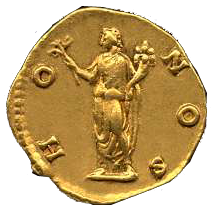
Honos or Honor was the Roman god personifying honor. He was closely associated with Virtus, the goddess of manliness, or bravery, and the two are frequently depicted together. Honos is typically shown wearing a chaplet of bay leaves, while Virtus is identified by her helmet.

Marcus Claudius Marcellus, five times elected as consul of the Roman Republic, was an important Roman military leader during the Gallic War of 225 BC and the Second Punic War. Marcellus gained the most prestigious award a Roman general could earn, the spolia opima, for killing the Gallic military leader and king Viridomarus in single combat in 222 BC at the Battle of Clastidium. Furthermore, he is noted for having conquered the fortified city of Syracuse in a protracted siege during which Archimedes, the famous mathematician, scientist, and inventor, was killed, despite Marcellus ordering the soldiers under his command not to harm him. Marcus Claudius Marcellus died in battle in 208 BC, leaving behind a legacy of military conquests and a reinvigorated Roman legend of the spolia opima.
Salmacida Spolia was the last masque performed at the English Court before the outbreak of the English Civil War. Written by Sir William Davenant, with costumes, sets, and stage effects designed by Inigo Jones and with music by Lewis Richard, it was performed at Whitehall Palace on 21 January 1640.
The spolia opima were the armour, arms, and other effects that an ancient Roman general stripped from the body of an opposing commander slain in single combat. The spolia opima were regarded as the most honourable of the several kinds of war trophies a commander could obtain, including enemy military standards and the peaks of warships.
The equites constituted the second of the property-based classes of ancient Rome, ranking below the senatorial class. A member of the equestrian order was known as an eques.
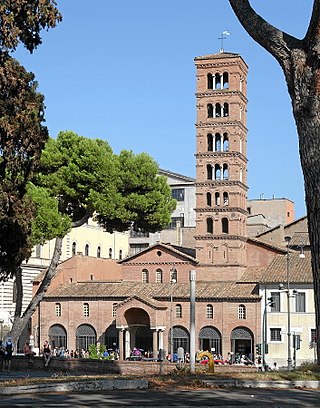
The Basilica of Saint Mary in Cosmedin is a minor basilican church in Rome, Italy, dedicated to the Virgin Mary. It is located in the rione (neighborhood) of Ripa. Constructed first in the sixth century as a diaconia (deaconry) in an area of the city populated by Greek immigrants, it celebrated Eastern rites and currently serves the Melkite Greek Catholic community of Rome. The church was expanded in the eighth century and renovated in the twelfth century, when a campanile was added. A Baroque facade and interior refurbishment of 1718 were removed in 1894-99; the exterior was restored to twelfth-century form, while the architecture of the interior recalls the eighth century with twelfth-century furnishings. The narthex of the church contains the famous Bocca della Verità sculpture.
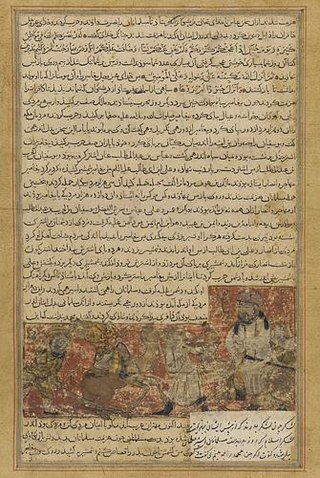
The Battle of Hunayn was a conflict between the Muslims of the Islamic prophet Muhammad and the tribe of Qays in the aftermath of the conquest of Mecca. The battle took place in 8 AH in the Hunayn valley on the route from Mecca to Taif. The battle ultimately ended in a decisive victory for the Muslims, and it is one of the few battles mentioned by name in the Qur'an, where it appears in Surat at-Tawbah.
Spoils or The Spoils may refer to:
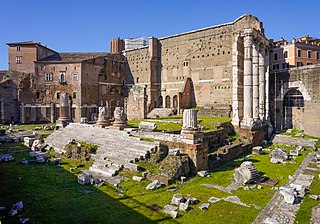
The Forum of Augustus is one of the Imperial fora of Rome, Italy, built by Augustus. It includes the Temple of Mars Ultor. The incomplete forum and its temple were inaugurated in 2 BC, 40 years after they were first vowed.

Spolia are stones taken from an old structure and repurposed for new construction or decorative purposes. It is the result of an ancient and widespread practice (spoliation) whereby stone that has been quarried, cut and used in a built structure is carried away to be used elsewhere. The practice is of particular interest to historians, archaeologists and architectural historians since the gravestones, monuments and architectural fragments of antiquity are frequently found embedded in structures built centuries or millennia later. The archaeologist Philip A. Barker gives the example of a late Roman period tombstone from Wroxeter that could be seen to have been cut down and undergone weathering while it was in use as part of an exterior wall and, possibly as late as the 5th century, reinscribed for reuse as a tombstone.
Spoil or spoils may refer to:
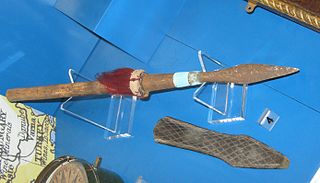
A prize of war is a piece of enemy property or land seized by a belligerent party during or after a war or battle. This term was used nearly exclusively in terms of captured ships during the 18th and 19th centuries.
Spoliation may refer to:
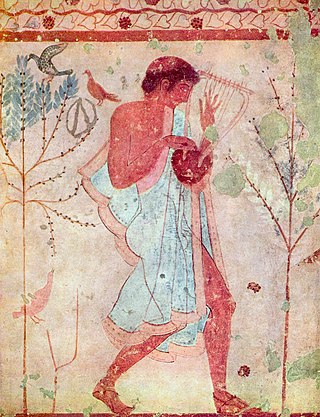
Lars Tolumnius was the most famous king of the wealthy Etruscan city-state of Veii. He is best remembered for instigating, and decisively losing, a war with the neighboring Roman Republic.
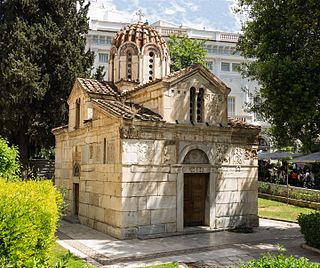
The Little Metropolis, formally the Church of St. Eleftherios or Panagia Gorgoepikoos, is a Byzantine church located at the Mitropoleos Square, next to the Metropolitan Cathedral of Athens.
Bubo, also spelled Bobbo, Poppo or Popo, was the pagan duke (dux) of the Frisians in the early eighth century. He is the first ruler whose name is known after Radbod. He did not recognise Frankish supremacy, and his territory probably only encompassed the north of Radbod's Frisia. He was defeated in a short war by the forces of Charles Martel, the duke of the Franks, in the Battle of the Boorne. The Frankish chroniclers, such as the Continuations of Fredegar, Vita Willibroridi of Alcuin and the Annales Mettenses priores, depict Bubo as a rebel and the Frankish invasion as a just war.

Caenina was a town nearby ancient Rome, in Latium.
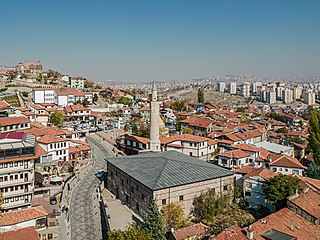
Aslanhane Mosque is a 13th-century mosque in Ankara, Turkey.

The Temple of Jupiter Feretrius was, according to legend, the first temple ever built in Rome. Its site is uncertain but is thought to have been on the Capitoline Hill.
Spoils of War or The Spoils of War may refer to: